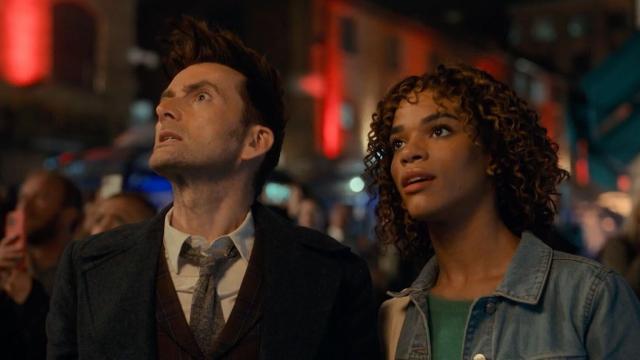Doctor Who viewers are willing to accept a lot of things—fascist pepperpots, farting skinsuit aliens, children-kidnapping goblins with Christmas number 1 ambitions, the existence of travel in time and space in general. But some of them just couldn’t deal with a singular trans character appearing in recent episodes. To which, the BBC says: tough, you’ve gotta deal with it anyway.
It was reported last month that the broadcaster received 144 complaints about the first of the three Doctor Who 60th anniversary specials, “The Star Beast,” with Deadline noting that the complaints specifically accused the BBC of the “anti-male,” “inappropriate inclusion” of a transgender character in the story: Rose Noble, played by Heartstopper’s Yasmin Finney, the daughter of Catherine Tate’s returning companion Donna. Rose is shown as having been supported by her wider family in transitioning, while still facing transphobic bullying from other kids at school. A supporting character in the story, her trans identity becomes an important factor in the resolution of the plot, as well as a culmination of story threads from Donna’s initial exit from Doctor Who back in the 2008 episode “Journey’s End.” It’s unclear what exactly was deemed “inappropriate” by complaints, beyond Rose’s very existence.
It has to be stressed that this number of complaints represent an incredibly small fraction of Doctor Who’s audience: 7.6 million people watched “The Star Beast” within the first week of its broadcast in the UK, making it one of the most-watched shows in the country that week as well as one of the most-viewed and best-received episodes of the show in several years. For the most part, that audience then stuck around, and, would you believe it, Doctor Who was not immediately ruined forever for including a trans teen. They’re still making it, even!
In spite of this statistical blip in reactions, the BBC has to offer a formal public response to complaints which have either “generated significant numbers of complaints or raised significant issues” with its programming, and has now, a month later, done so in response to Rose’s inclusion in Doctor Who. “As regular viewers of Doctor Who will be aware,” the BBC’s response begins, “the show has and will always continue to proudly celebrate diversity and reflect the world we live in. We are always mindful of the content within our episodes.”
It’s about as politely dismissive as the broadcaster can get, but dismissive enough: Doctor Who is not going to change showing the full spectrum of humanity wherever it can. It’s certainly less blunt than returning showrunner Russell T. Davies put it during a press conference for the show last month:
“[There are] newspapers of absolute hate, and venom, and destruction, and violence who would rather see that sort of thing wiped off the screen destroyed,” the showrunner said of recent increasing attacks on trans representation in media and trans livelihoods at large in the UK. “Shame on you, and good luck to you in your lonely lives.”
Want more entertainment news? Check out when to expect the latest Marvel, Star Wars, and DC releases, what’s coming to cinemas in Australia this year, and everything streaming this month across all platforms. Check out our dedicated Entertainment tab for more.
